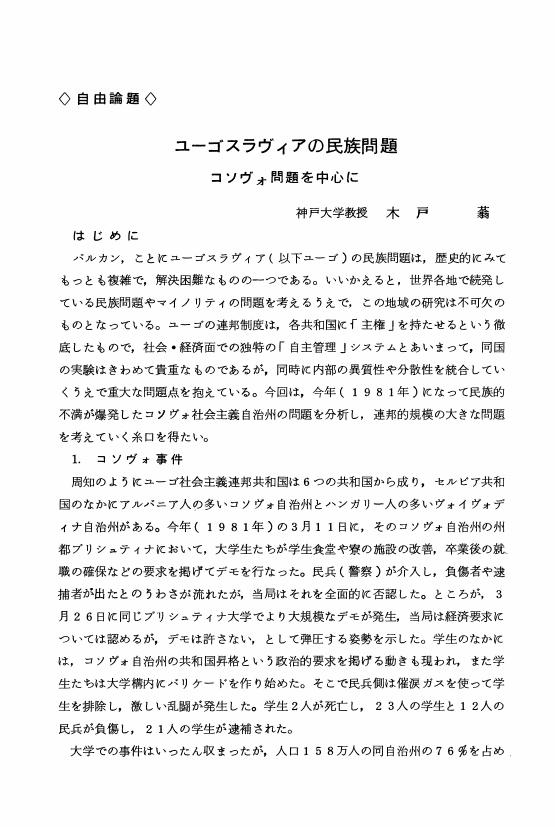2 0 0 0 OA ユーゴスラヴィアの民族問題
- 著者
- 木戸 蓊
- 出版者
- THE JAPANESE ASSOCIATION FOR RUSSIAN AND EAST EUROPEAN STUDIES
- 雑誌
- ソ連・東欧学会年報 (ISSN:03867226)
- 巻号頁・発行日
- vol.1981, no.10, pp.102-114, 1981 (Released:2010-03-16)
- 参考文献数
- 15
1 0 0 0 OA イムレ・ナジ『人間を疎かにしないような共産主義』
- 著者
- 木戸 蓊
- 出版者
- 一般財団法人 日本国際政治学会
- 雑誌
- 国際政治 (ISSN:04542215)
- 巻号頁・発行日
- vol.1959, no.7, pp.125-127, 1959-01-10 (Released:2010-09-01)
1 0 0 0 OA F. フェイト『スターリン以後の東欧』岩波書店
- 著者
- 木戸 蓊
- 出版者
- 東欧史研究会
- 雑誌
- 東欧史研究 (ISSN:03866904)
- 巻号頁・発行日
- vol.2, pp.76-77, 1979 (Released:2017-09-28)
1 0 0 0 OA ユーゴスラヴィアの全人民的防衛
- 著者
- 木戸 蓊
- 出版者
- JAPAN ASSOCIATION OF INTERNATIONAL RELATIONS
- 雑誌
- 国際政治 (ISSN:04542215)
- 巻号頁・発行日
- vol.1979, no.63, pp.6-21,L1, 1979-10-15 (Released:2010-09-01)
- 参考文献数
- 14
After the Czechoslovak Crisis in 1968, Yugoslavia has adopted the plan of “General People's defense, ” which has brought about a fundamental change in her defense policy. According to that plan, a Territorial Defense Force is organized besides the Yugoslav People's Army (the conventional force). In case of a massive blitz attack by an overwhelmingly superior big power, the role of the Yugoslav People's Army would be to delay enemy penetration sufficiently for the country to carry out total mobilization. Then, the Army and the Territorial Defense Force would wage a total resistance war against the invader. The aim of the General People's Defense is, thus, to divert a big power from his intention of aggression against Yugoslavia, by demonstrating that a blitz attack would fail and would be turned into a bog of prolonged war.A lot of obstacles would appear in the way of implementation of the General People's Defense. For example, the process of urbanization in postwar Yugoslavia has radically changed the conditions of partisan war which had formerly been fought mainly in villages. Furthermore, transformation of the value basis of younger generation caused by social mobilization, as well as decline of the authority of Partisan myth, will influence the conditions of defense. Nationality conflicts in multinational Yugoslavia may also constitute an obstacle to the function of the General People's Defense. For all these problems, the idea of General People's Defense offers us a very valuable example of defense conception in both political and military sense.
1 0 0 0 OA 北大西洋条約機構 (NATO) の発展
- 著者
- 木戸 蓊
- 出版者
- JAPAN ASSOCIATION OF INTERNATIONAL RELATIONS
- 雑誌
- 国際政治 (ISSN:04542215)
- 巻号頁・発行日
- vol.1959, no.10, pp.50-61, 1959-10-15 (Released:2010-09-01)
- 参考文献数
- 13



